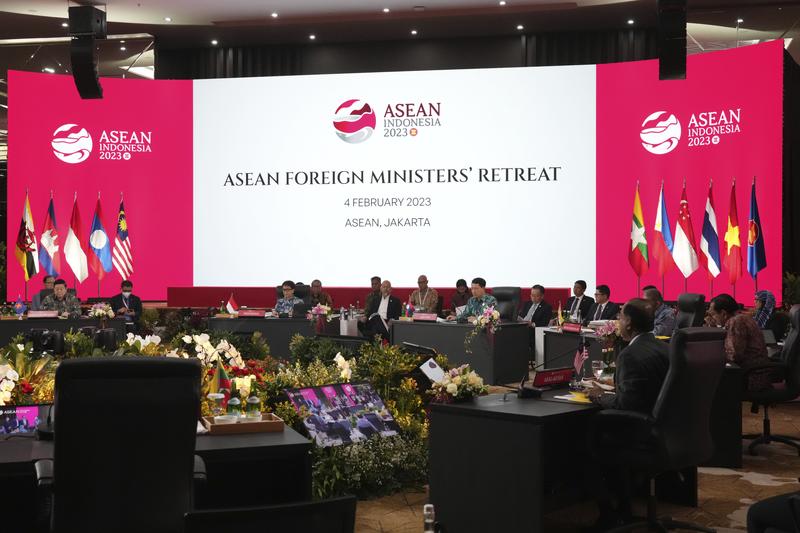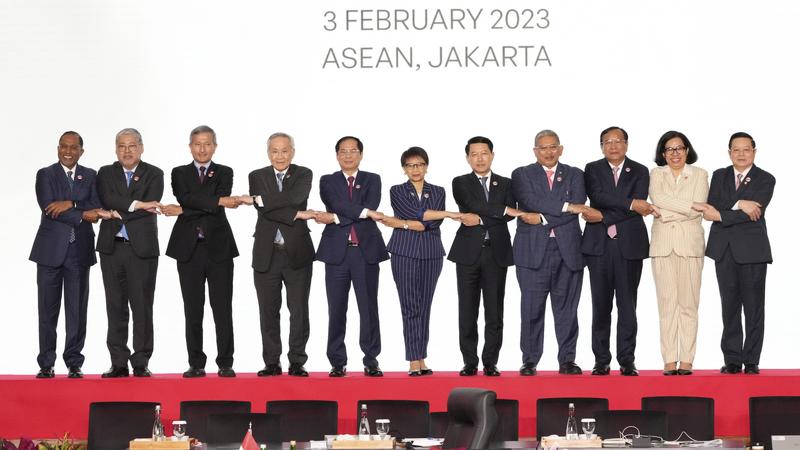 Foreign ministers and delegates attend the plenary session of the ASEAN the ASEAN foreign ministers retreat in Jakarta, Indonesia, Feb 4, 2023. (PHOTO / AP)
Foreign ministers and delegates attend the plenary session of the ASEAN the ASEAN foreign ministers retreat in Jakarta, Indonesia, Feb 4, 2023. (PHOTO / AP)
Indonesia kicked off its chairmanship of the Association of Southeast Asian Nations (ASEAN) with its member-countries reaffirming their “strong commitment” to regionalism and multilateralism. This is an indication of how the regional bloc will confront the various challenges to its economy and security, analysts said.
Indonesia is heading the region’s largest forum at a time when ASEAN members are recovering from the pandemic while battling food inflation and the harsh impact of climate change. The region is also dealing with tension over the South China Sea and the crisis in Myanmar.
These were some of the key issues on the agenda at the ASEAN Foreign Ministers’ Retreat held Feb 2 to 4 in Jakarta - the first major meeting held after Indonesia formally assumed the chairmanship of ASEAN on Jan 1.
It was also the first time that a delegation from Timor-Leste attended a ministerial level meeting of ASEAN. The association has agreed in principle to admit Timor-Leste as its 11th member in November 2022.
In a statement issued at the conclusion of the retreat, ASEAN foreign ministers reiterated their “strong commitment to upholding regionalism and multilateralism” and stressed the importance of adhering to key principles, shared values and norms that were enshrined in various treaties and charters including the UN Charter, the ASEAN Charter, the Declaration on Zone of Peace, Freedom and Neutrality and the 1982 United Nations Convention on the Law of the Sea (UNCLOS)
Timor-Leste’s Minister of Foreign Affairs and Cooperation Adaljiza Magno said it is an “honor and privilege” to participate in the meeting and thanked all ASEAN member countries “for their wise decision to accept us”, according to a report filed by Xinhua News Agency.
ALSO READ: Chairing ASEAN, Indonesia 'pushes for more concrete cooperation'
Analysts recall how Indonesia was complimented for its presidency of the Group of 20 Summit in 2022. Despite the challenges that include the Russia-Ukraine conflict and the pandemic, Indonesian President Joko Widodo managed to convene a summit that produced a joint declaration, known as the G20 Bali Leaders’ Declaration.
“Indonesia’s G20 Presidency amidst ongoing geopolitical crisis was considered successful and providing a leverage in managing its ASEAN chairmanship,” said Shofwan Al Banna Choiruzzad, assistant professor at the department of international relations in the University of Indonesia.
But he said Indonesia’s success in G20 also meant that there is increased pressure for Indonesia to lead ASEAN in solving difficult issues in the region, such as the Myanmar crisis. Myanmar has been under a military regime since February 2021.
“We need to manage expectations from different stakeholders,” Shofwan said.
READ MORE: Timor-Leste attends first ASEAN meeting
For this year’s ASEAN summit, Indonesia “has the legitimacy and capacity” to serve as leader of the regional group, according to Radityo Dharmaputra, lecturer at the department of international relations at Airlangga University in Indonesia.
Dharmaputra said Indonesia can uphold the principle of ASEAN centrality by actively engaging in these critical global issues and offering ASEAN as a platform for negotiations.
The principle of ASEAN centrality refers to advancing and implementing policies that are based on regional interest. With this ASEAN engages with a number of other countries at its summits.
 (From left to right) Malaysian Foreign Minister Zambry Abdul Kadir, Philippine's Foreign Secretary Enrique Manalo, Singaporean Foreign Minister Vivian Balakrishnan, Thailand's Foreign Minister Don Pramudwinai, Vietnam's Foreign Minister Bui Thanh Son, Indonesian Foreign Minister Retno Marsudi, Laotian Foreign Minister Saleumxay Kommasith, Brunei's Second Minister of Foreign Affair Erywan Yusof, Cambodia's Foreign Minister Prak Sokhonn, East Timor's Foreign Minister Adaljiza Magno and ASEAN Secretary General Kao Kim Hourn hold hands as they pose for a group photo during the ASEAN Coordinating Council Meeting at the ASEAN Secretariat in Jakarta, Indonesia, Feb 3, 2023. (PHOTO / AP)
(From left to right) Malaysian Foreign Minister Zambry Abdul Kadir, Philippine's Foreign Secretary Enrique Manalo, Singaporean Foreign Minister Vivian Balakrishnan, Thailand's Foreign Minister Don Pramudwinai, Vietnam's Foreign Minister Bui Thanh Son, Indonesian Foreign Minister Retno Marsudi, Laotian Foreign Minister Saleumxay Kommasith, Brunei's Second Minister of Foreign Affair Erywan Yusof, Cambodia's Foreign Minister Prak Sokhonn, East Timor's Foreign Minister Adaljiza Magno and ASEAN Secretary General Kao Kim Hourn hold hands as they pose for a group photo during the ASEAN Coordinating Council Meeting at the ASEAN Secretariat in Jakarta, Indonesia, Feb 3, 2023. (PHOTO / AP)
Lina Alexandra, head of the department of international relations of the Jakarta-based Centre for Strategic and International Studies, said that many of the issues included in the G20 Bali Leaders’ Declaration can be followed in this year’s summit which is scheduled to be held in November.
“Action is needed and not just declarations,” Alexandra said, noting that G20 issues such as stable food supply, digital economy and sustainable economic goals can also be part of the ASEAN agenda under Indonesia’s chairmanship.
“ASEAN also needs to give attention to (the welfare) of its people. ASEAN needs to be a people-oriented community.”
READ MORE: Version 3.0 China-ASEAN FTA negotiations start 1st-round talks
In a statement issued at the conclusion of the retreat, ASEAN foreign ministers reiterated their “strong commitment to upholding regionalism and multilateralism” and stressed the importance of adhering to key principles, shared values and norms that were enshrined in various treaties and charters including the UN Charter, the ASEAN Charter, the Declaration on Zone of Peace, Freedom and Neutrality and the 1982 United Nations Convention on the Law of the Sea (UNCLOS).
They also urged all parties “to cooperate in a constructive and peaceful manner” for the South China Sea to become a sea of peace, stability and prosperity.
The statement expressed hope for the early conclusion of an “effective and substantive COC” in the South China Sea consistent with international law, including the 1982 UNCLOS.
“The commitment of (ASEAN) members to conclude the negotiation of COC as soon as possible is obvious, bearing in mind the need to have a substantive, effective and actionable COC,” Indonesian Foreign Affairs Minister Retno Marsudi said in a press briefing.
She said Indonesia will hold a new round of negotiations for the COC, with the first meeting scheduled to be held next month.
ASEAN foreign ministers also urged for “significant progress” in the implementation of the Five-Point Consensus to pave the way for an inclusive national dialogue in Myanmar.
ALSO READ: ASEAN ministers discuss Myanmar at Jakarta gathering
“We stressed that inclusive national dialogue is key to finding a peaceful resolution to the situation in Myanmar. We also stressed that all stakeholders must create a conducive environment for an inclusive national dialogue by ceasing violence and ensuring the timely and unhindered delivery of humanitarian assistance,” the ministers said in a statement.
Myanmar was invited to the meeting in Jakarta but on a non-political level. The government did not send a delegate.
Leonardus Jegho in Jakarta contributed to this story.


